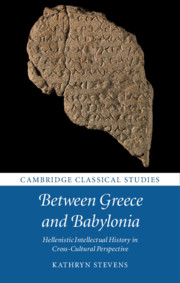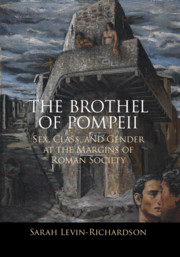Refine search
Actions for selected content:
23990 results in Ancient history
9 - Developments after the Rise of Macedon
-
- Book:
- Ancient Greece
- Published online:
- 25 March 2019
- Print publication:
- 30 May 2019, pp 173-184
-
- Chapter
- Export citation
2 - The Ancient Greek Landscape
-
- Book:
- Ancient Greece
- Published online:
- 25 March 2019
- Print publication:
- 30 May 2019, pp 9-17
-
- Chapter
- Export citation
10 - The Cretan Difference
-
- Book:
- Ancient Greece
- Published online:
- 25 March 2019
- Print publication:
- 30 May 2019, pp 185-203
-
- Chapter
- Export citation
Figures
-
- Book:
- Ancient Greece
- Published online:
- 25 March 2019
- Print publication:
- 30 May 2019, pp xi-xii
-
- Chapter
- Export citation
6 - Changes in the Latter Part of the Second Millennium BCE
-
- Book:
- Ancient Greece
- Published online:
- 25 March 2019
- Print publication:
- 30 May 2019, pp 78-99
-
- Chapter
- Export citation
8 - A Brave New World
-
- Book:
- Ancient Greece
- Published online:
- 25 March 2019
- Print publication:
- 30 May 2019, pp 133-172
-
- Chapter
- Export citation
4 - Developments ca. 3200–2200 BCE
-
- Book:
- Ancient Greece
- Published online:
- 25 March 2019
- Print publication:
- 30 May 2019, pp 31-47
-
- Chapter
- Export citation
11 - The Sweep of Things
-
- Book:
- Ancient Greece
- Published online:
- 25 March 2019
- Print publication:
- 30 May 2019, pp 204-207
-
- Chapter
- Export citation
Copyright page
-
- Book:
- Ancient Greece
- Published online:
- 25 March 2019
- Print publication:
- 30 May 2019, pp vi-vi
-
- Chapter
- Export citation
5 - The Beginning of Change and the Evolution of a Koine
-
- Book:
- Ancient Greece
- Published online:
- 25 March 2019
- Print publication:
- 30 May 2019, pp 48-77
-
- Chapter
- Export citation
Acknowledgments
-
- Book:
- Ancient Greece
- Published online:
- 25 March 2019
- Print publication:
- 30 May 2019, pp xv-xvi
-
- Chapter
- Export citation
Bibliography
-
- Book:
- Ancient Greece
- Published online:
- 25 March 2019
- Print publication:
- 30 May 2019, pp 225-266
-
- Chapter
- Export citation
1 - My Analytical Frame
-
- Book:
- Ancient Greece
- Published online:
- 25 March 2019
- Print publication:
- 30 May 2019, pp 1-8
-
- Chapter
- Export citation
Boxes
-
- Book:
- Ancient Greece
- Published online:
- 25 March 2019
- Print publication:
- 30 May 2019, pp xiii-xiv
-
- Chapter
- Export citation
12 - Greece Is Not Alone
-
- Book:
- Ancient Greece
- Published online:
- 25 March 2019
- Print publication:
- 30 May 2019, pp 208-218
-
- Chapter
- Export citation
3 - The Neolithic in Greece
-
- Book:
- Ancient Greece
- Published online:
- 25 March 2019
- Print publication:
- 30 May 2019, pp 18-30
-
- Chapter
- Export citation

Between Greece and Babylonia
- Hellenistic Intellectual History in Cross-Cultural Perspective
-
- Published online:
- 29 May 2019
- Print publication:
- 23 May 2019

The Brothel of Pompeii
- Sex, Class, and Gender at the Margins of Roman Society
-
- Published online:
- 25 May 2019
- Print publication:
- 23 May 2019
A Note on Transliteration, Transcription and Translation
-
- Book:
- Between Greece and Babylonia
- Published online:
- 29 May 2019
- Print publication:
- 23 May 2019, pp xiv-xiv
-
- Chapter
- Export citation
Four - Frescoes
- from Part I
-
- Book:
- The Brothel of Pompeii
- Published online:
- 25 May 2019
- Print publication:
- 23 May 2019, pp 64-80
-
- Chapter
- Export citation
